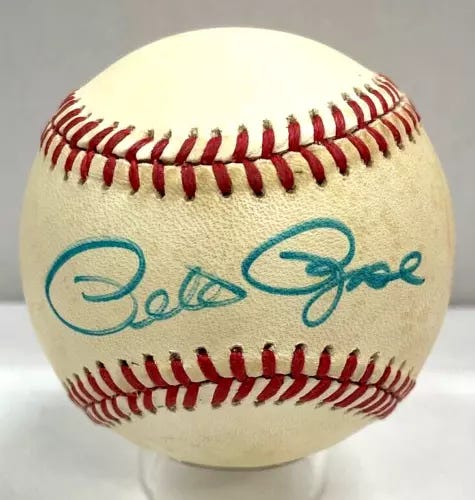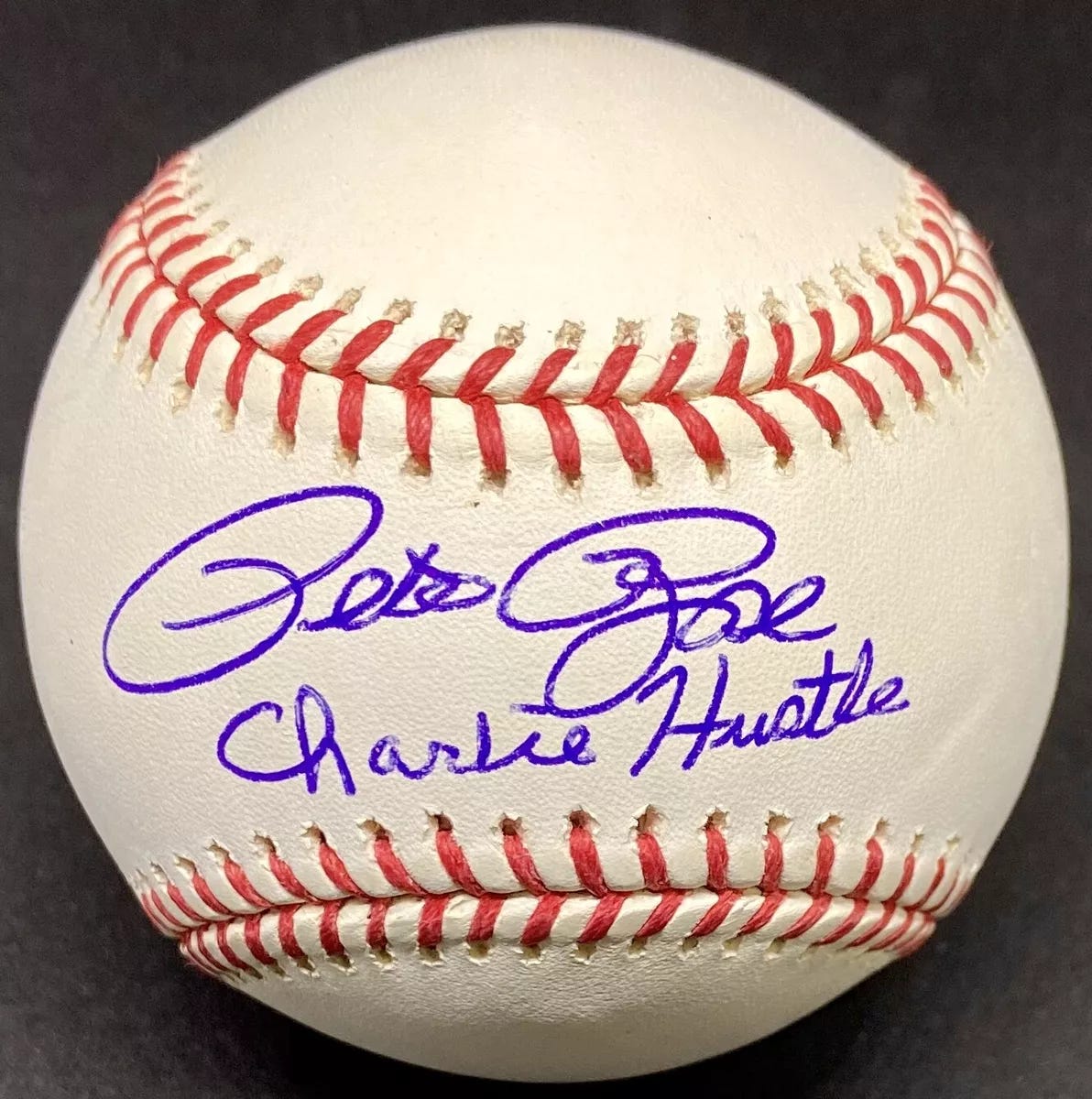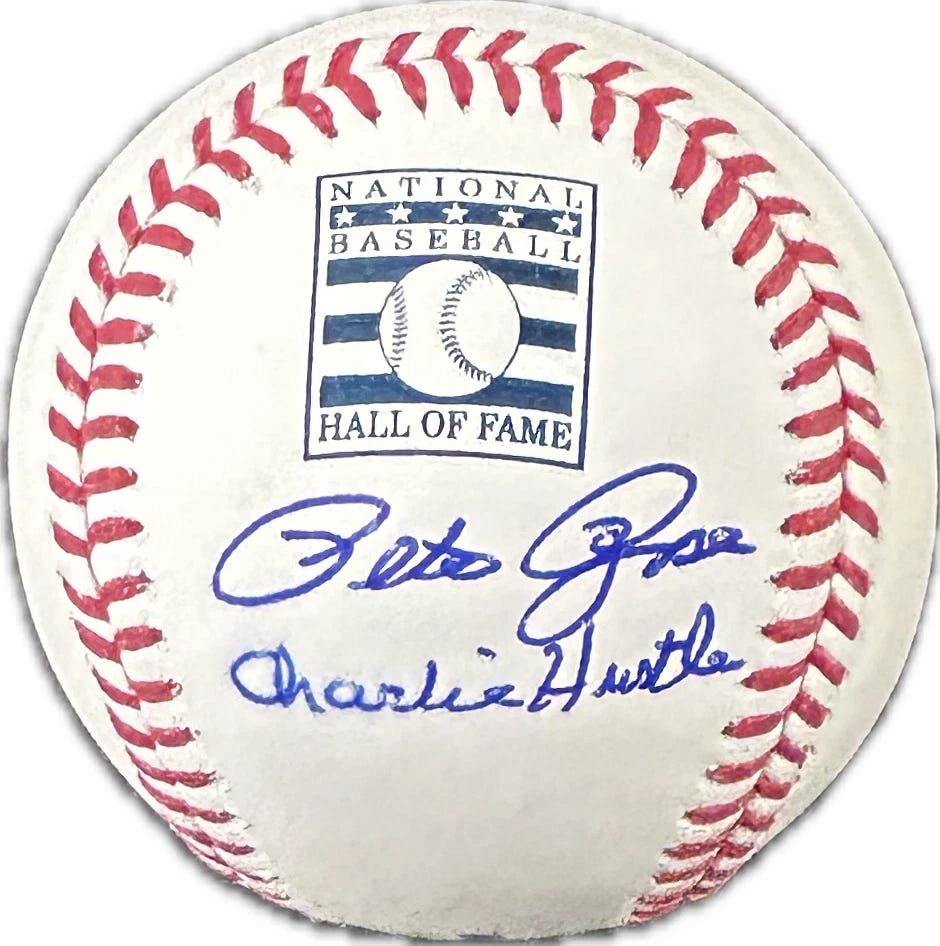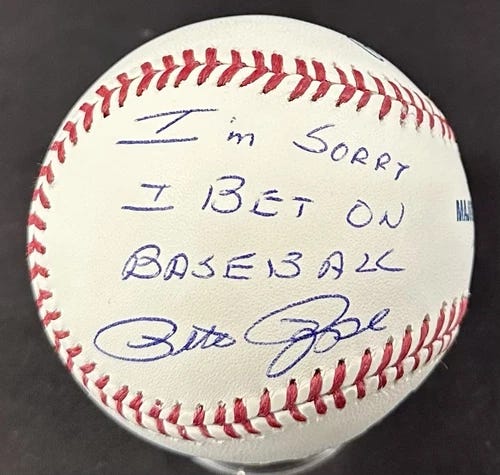Republicans Don't Care About the Law. They're Too Busy Worshipping the Golden Calf of Power.
PLUS: What would Pete Rose's Hall of Fame plaque say?
Today’s lesson is from the Book of Exodus.
The Lord called Moses to the top of Mount Sinai, so Moses went up. There the Lord said to Moses, “I have told you and you have shared with my people the laws I want them to follow. Now, just for the record, I want you to inscribe my laws upon these stone tablets.”
The Lord then spoke these words:
“I am the Lord your God, who brought you out of slavery in Egypt. These are my commandments to you.”
Moses held up his hand. “Sorry, but before we get too far into this, how many of these commandments are there exactly? No disrespect, it’s just that I only have so much room on these tablets and I want to make sure it all fits.”
“Fair question,” said the Lord. The Lord checked the Lord’s notes. “You know, I think I can get all of this down to a nice even ten. But the last ones are longer than the first ones, so maybe put six on the first tablet and four on the other?”
Moses nodded his head. “As you wish Lord.”
The Lord continued. “Now where was I? Oh yes, the First Commandment. ‘I am the Lord your God. You shall have no other gods before me.’”
Moses raised his hand a second time. “Sorry to interrupt again, but I had made that ‘I am the Lord your God’ line the introduction. Do you want that included in the First Commandment?”
The Lord thought about Moses’ question for a while. “I’m not sure. Maybe? You know, just let them sort the numbering out for themselves. Oh, I almost forgot! Work this in there as well: ‘You shall not make graven images.’ You know, like, idols.”
Moses did as the Lord asked. The Lord proceeded to declare (give or take) nine more commandments, including some pretty important ones. When the Lord finished, the Lord said, “Now take my words and share them with the people of Israel, as they have grown corrupt.”
Moses descended Mount Sinai with the two stone tablets engraved with the Ten Commandments in his hands. When he neared the base of the mountain, he began hearing sounds of great revelry, and when he entered camp, he found the people of Israel had thrown themselves a massive party. On an altar at the center of the celebration was a golden calf, which many danced around and worshipped.
Moses was furious and threw the tablets to the ground, breaking them into pieces. “What is going on here!” he exclaimed. “Why do you violate the Lord’s commandments? Why do you commit such sin?”
Aaron signaled to the DJ to cut the music and rushed over to Moses. “Just take it easy, bruh,” Aaron said. “They’re just letting off some steam. You’ve been gone for, like, forty days. We thought you were never coming back.”
Moses replied angrily, “I told you I was climbing the mountain to talk to God! I was right there—with God!—the whole time! I’m up there working my fingers to the bone chiseling the Lord’s commandments into stone while all the rest of you are down here prostrating yourselves before a cow made of gold! That’s a direct violation of the First Commandment!”
Aaron placed his hands on Moses’ shoulders and looked him straight in the eyes. “Moses, listen: The First Commandment, sure, whatever. But these people could have been worshipping golden calves out of sight in their tents this whole time. That’s not what they’ve done here, though. Instead, they’ve decided to bring all this…look, I don’t how to characterize it, but whatever it is they’re doing, they’ve brought it all out into the open, where everyone can see them doing it. No one’s hiding anything. What’s wrong with that?”
Moses thought about Aaron’s words. He looked up at Mount Sinai, and then back at the mass of people crowded around the golden calf.
“You make a good point,” Moses said. “The Ten Commandments should only apply to things you do secretly. Anything someone does in full view of others can’t be considered a sin. You’re a wise man, Aaron. I’m fine with all this. Party on!”
Here ends today’s lesson.
No, I kid, that’s not how that story goes. It actually involves some divine forgiveness (as well as mass murder) but we’re all familiar with the basic Sunday School version: Moses climbs the mountain, gets the Ten Commandments, climbs back down, finds the Israelites worshipping a golden calf, and gets so mad about it he shatters the Ten Commandments. This causes the people to suffer and feel great shame. (In some versions, the calf explodes and Edward G. Robinson is flung into Hell.) But the lesson is straightforward: Worship God and God alone, and follow God’s law.
There is nothing in the story that says laws only apply to behavior people conceal from others. There is nothing in the story that says people can violate laws (and rules and norms and morals, etc.) so long as they do so openly and in full view of others. To claim that’s the way the law works is absurd on its face. Someone speeding 100 mph down the interstate can’t get out of a ticket by arguing they did so in the company of other motorists. A husband can’t get off the hook for adultery by inviting his wife and others to watch him consummate the affair. OJ is still guilty if he brings witnesses with him. The Watergate break-in does not cease to be a crime if Richard Nixon holds a televised address to tell the nation his operatives are currently breaking into entering the Democratic Party headquarters to steal pick-up some documents. You can’t shoot someone in the middle of a crowded 5th Avenue and get away with it.
You may be wondering why I’m stating the obvious here. It’s because of something Republican Speaker of the House Mike Johnson said last week at a press conference. Johnson was asked if he was as worried about Don Trump and his family’s foreign business dealings as the Speaker was about President Biden and his family’s foreign business dealings, which had led Johnson to support an impeachment inquiry into Biden. The reporter cited both Trump’s trip last week to the Middle East, where his family has billions of dollars in investments, and his meme coin business, which he has used to auction off access to the White House.
It's an important question because Trump has exhibited a stunning disdain for the law in both his official and personal capacities as president since retaking office. He has impounded federal funding; eliminated agencies authorized by acts of Congress; fired federal workers without following contractual procedures; denied due process to individuals accused of being in the country illegally; imprisoned people who have not been found guilty of crimes; deported American citizens to foreign countries; used lawsuits to bend universities, media outlets, and law firms to his will; weaponized the Department of Justice to persecute his political enemies; and repeatedly ignored court orders. His pardon of the Capitol rioters signaled to allies he will exonerate anyone who commits a crime on his behalf. He has said he doesn’t know if he needs to uphold the Constitution as president. Through overseas business deals, club memberships, his social media company, and cryptocurrency ventures (the latter of which I have written about before) he and his family have created opaque channels wealthy individuals and both domestic and foreign entities can use to access, enrich, and potentially bribe the president.
Johnson’s answer was breathtaking:
Look, there are authorities that police executive branch ethics rules. I’m not an expert in that. My expertise is in the House. I’ll say that the reason many people refer to the Bidens as the ‘Biden crime family’ is because they were doing all this stuff behind curtains, in the back rooms; they were trying to conceal it, and they repeatedly lied about it, and they set up shell companies, and the family was all engaged in getting all on the dole. Whatever President Trump is doing is out in the open, they’re not trying to conceal anything.
The reporter reminded Johnson the meme coin business was definitely not transparent, to which Johnson replied
I don’t know anything about the meme coin thing. I don’t know, I can just tell you, I mean President Trump has had nothing to hide; he’s very upfront about it. There are people who watch all the ethics of that, but I mean I’ve got to be concerned with running the House of Representatives.
The reporter then reminded Johnson oversight was a congressional responsibility, to which Johnson answered
Congress has an oversight responsibility, but I think, so far as I know the ethics are all being followed.
The most charitable interpretation of Johnson’s comments is that in politics, the people are the ultimate judge of right and wrong, but to pass their judgment, the people need politicians to act transparently. Johnson is fine with Trump because whatever it is he’s doing—legal, illegal, ethical, unethical—he’s doing it so the public is aware of it and can factor it into their political verdict.
But while majorities certainly empower the individuals they elect to office, winning an election does not provide the victor with a license to openly break any law, violate any procedure, and ignore any ruling. This is true even if we assume the public would see all this, swing their Sword of Damocles, and vote the crook out of office the next time he stood for election. Giving an elected official that much power would be a license for abuse. In fact, it wouldn’t be hard at all for such a powerful, unchecked, legally unbound president to snatch that sword out of the public’s hands and turn it against them. This is why we fought the American Revolution. It’s why we have the Constitution. In the United States, power is not absolute nor only periodically restrained. We live in a nation of laws, not men.
Of all people, Mike Johnson should know this. As he once famously said, “I am a Christian, a husband, a father, a life-long conservative, constitutional law attorney, and a small business owner in that order.” In fact, I would say he’s most of those things all at the same time, since he worked as a constitutional law attorney for conservative Christian legal advocacy groups that believe the word of God is entwined with the Constitution. This guy presumably could/would claim a deep understanding of the law in both its divine and human forms, how the law works, and the law’s relationship to public ethics. Furthermore, he believes in the inerrancy of the Bible and is a Constitutional textualist, meaning he thinks both of those documents and their legal/moral decrees ought to be taken literally and understood in their original context; that also means he does not believe the meaning of the Bible and the Constitution evolve over time, as that would allow people to sneak their own beliefs into documents whose meanings are set in stone. No room for moral relativism here, no bending the rules, no reading into the law what you want it to say. When it comes to the law, Mike Johnson is strict.
All of which makes what Johnson said one of the dumbest things ever uttered by a lawyer, let alone a Christian lawyer, let alone a Christian lawyer who makes laws. No lawyer would ever let a criminal or “crime family” walk for criming in public. No Christian would ever condone sinning so long as the sinner is “doing it out in the open.” (“Christians” like Johnson actually have a long history of condemning people for doing things they [the “Christians”] disapprove of out in the open.) No lawmaker would ever tolerate people breaking a law he enacted so long as they’re “very upfront” about breaking it.
Also, how naïve/stupid/evil do you have to be to say, “I don’t know anything about the meme coin thing,” and then seconds later say, “so far as I know the ethics are all being followed,” particularly when the question concerns notorious scofflaw and amoralist Don Trump?
Just consider how absurd this is in context as well. Johnson spent the Biden administration chasing conspiracy theories about the “Biden crime family,” and, despite evidence that actually exonerated Biden, continued to hound the president. Yet now Johnson is not only completely unconcerned Trump is breaking the law despite a.) Evidence he is; b.) Plenty of suspect behavior; and c.) Trump’s past entanglements with the legal system, but he’s fine with whatever Trump’s doing so long as he’s flaunting the law in all of our faces. It’s more than an admission Trump is breaking the law. It’s a permission slip, and a message to anyone who might end up in Trump’s crosshairs that Johnson and his Republican cavalry won’t be coming to their rescue if Trump comes after them.
This is a complete moral and ethical breakdown that paves the way to tyranny. It’s being brought to us by a cabal of politicians who have spent decades running for office as the “law and order” party while insisting we are bound to the “strict” “literal” meaning of the Constitution and the Bible. Now they’re telling us a man who once bragged they would let him get away with murdering someone in the middle of downtown New York can break the law all he wants even if we all see him do it. Don’t believe for a second what these guys say about their devotion to God and the law. It’s all a lie. They have no moral credibility. They’ve been worshipping the golden calf of power all along.
Here ends the lesson.
Intermission
Signals and Noise
From Substack:
“Corruption and a Security Catastrophe in Plane Sight” by Garrett M. Graff (Doomsday Scenario)
From The Atlantic:
“Due Process Is a Right, Not a Privilege You Get for Being Good” by Adam Serwer
“Trump’s Legal Strategy Has a Name” by Andrew O’Donohue
“The Terrible Optics of ICE Enforcement Are Fueling a Trump Immigration Backlash” by Nick Miroff
“America Is Having a Showboater Moment” by Jill Leovy
“China Called Trump’s Bluff” by Jonathan Chait
“The Ultimate Bait and Switch of Trump’s Tariffs” by David Frum
“What the U.K. Deal Reveals About Trump’s Trade Strategy” by Scott Lincicome
“Who Counts as Christian?” by Elizabeth Bruenig
“Germany Can’t Ban Its Way to Democracy” by Graeme Wood
From the New York Times:
“Here’s What Elon Musk Sees When He Opens X” by Stuart A. Thompson
“They Were Waiting for Trump All Along” by Jamelle Bouie
“In High-Stakes Negotiations, Trump’s Opponents Are Learning His Patterns” by David E. Sanger
From the Washington Post:
“Now Might Be the Exactly the Worst Time to Cut Medicaid and Food Stamps” by Catherine Rampell
“Conduct Oversight on Trump’s Graft — or Censure James Comer” by Philip Bump
“How DOGE’s Grand Plan to Remake Social Security is Backfiring” by Hannah Natanson, Lisa Rein, and Meryl Kornfield
“What Pennsylvania Factory Workers Say About Trump’s Tariffs Now” by Heather Long
“Manufacturing is Thriving in the South. Here’s Why Neither Party Can Admit It” by Gary Winslett
From the Wall Street Journal:
“Trump Promised to End Two Wars Quickly. In Private, He Admits He’s Frustrated” by Josh Dawsey and Alexander Ward
From The Guardian:
“Yes, the Media’s Biden Coverage was Flawed. But Its Reporting on Trump was Far Worse” by Margaret Sullivan
From Vox:
“Trump’s Tariffs Have Already Failed at Their Main Job” by Andrew Prokop
“The Rise of the Regretful Trump Voter” by Christian Paz
From Politico:
“Trump’s Gulf Tour Doesn’t Bode Well For Israel” by Jamie Dettmer
From Wired:
“A VIP Seat at Donald Trump’s Crypto Dinner Cost at Least $2 Million” by Paige Oamek, Joel Khalili, and Natasha Bernal
From NBC News:
From CBS News:
“Most Americans Don’t Earn Enough to Afford Cost of Living” by Megan Cerullo
From Ms.:
“Why Do MAGA Women Dress Like That?” by Leora Tannenbaum
Garbage Time: What Would Pete Rose’s Hall of Fame Plaque Say?
(Garbage Time theme song here)
My wife took the picture posted above during the summer of 2022 in a store down the street from the Baseball Hall of Fame in Cooperstown, New York. A friendly local had recommended parking on a side street rather than in the expensive hourly lot, so I was off moving the car when she sent this picture to me with a message reading, “Pete Rose is here?” That’s Rose in the green shirt.
The Baseball Hall of Fame had just inducted its most recent class the weekend prior, which meant that not only had a bunch of hall-of-famers recently descended upon Cooperstown, but so had Pete Rose. Rose is famously not a hall-of-famer, but he had a habit of showing up for the festivities anyway, taking up residency in a main street memorabilia shop to sign autographs. Other hall-of-famers would do the same, even at times alongside Rose, but Charlie Hustle was almost always the biggest, most accessible draw.
I stepped inside the shop to get a look at Rose myself. Yep, it was him. I could have just walked up to him, hung out with one of the game’s greatest players, and, despite the sign, I don’t think Rose or the store’s proprietor would have cared all that much. It was like he was an exhibit. People were shelling out thirty bucks to get into the Hall of Fame to spend the day in the company of inanimate bats and balls and uniforms that had once been used by baseball’s mostly-dead greatest players, but here, in what had become a rogue pop-up annex of the museum, I could get a glimpse of the real deal, greatness incarnate, for free. What inside the Hall of Fame could compare? Babe Ruth’s bat? Willie Mays’s cleats? The San Diego Chicken suit? I went to the Baseball Hall of Fame, and the most memorable thing I saw that day was Pete Rose sitting at a table in a store on Main Street.
As I stood there taking in baseball’s all-time hit leader, a boy around the age of twelve came up to me. “That’s Pete Rose,” he said. I told him I knew that, somewhat surprised he not only knew that, too, but was excited about it. The kid held up an autographed baseball. “He’s really nice. He signed my ball.” A notice on the counter indicated Rose was signing baseballs for $75 a pop. I didn’t have the heart to tell the kid he overpaid. I knew Rose put his signature on dozens, maybe hundreds of balls a day, even when he wasn’t signing at events. It’s not hard to find them (overpriced) on Ebay:
There’s a reason Rose was in that shop mere feet from the Hall of Fame rather than in the Hall of Fame itself: He had been banned from baseball for life in 1989 for betting on games while playing for and managing the Cincinnati Reds. He was declared ineligible for induction into the Hall of Fame two years later. Although he initially denied betting on baseball, Rose admitted he did so in 2004, when he also admitted to betting on the Reds. Although he asked repeatedly during his lifetime for reinstatement, it never happened, mainly due to his ongoing boorish behavior, his continued association with gambling, and damaging revelations about his past. (My favorite thing about that article is when Rose says the press shouldn’t care about things that happened fifty years ago, which I guess means we shouldn’t care at all about Rose’s playing career, which his entire case for induction depends upon.)
Gambling on the game is just about the worst thing a baseball player can do, as it undermines the public’s faith that they are watching a real athletic competition rather than a staged event. When you set foot in a major league ballpark, you know you’re watching a game with an undetermined outcome rather than, say, a Harlem Globetrotters exhibition or a professional wrestling match.
Rose violated that trust, and, consequently, was banned. It doesn’t matter that Rose claimed he only bet on the Reds to win, as there were occasions when he didn’t bet on Reds games, which sent a strong message to other gamblers in the know about what Rose thought of his team that day. If Rose had money on a game he expected to win, he might pull out all the stops to win that game (such as by exhausting his bullpen) even if that meant making the following day’s game more difficult to win; alternately, if he didn’t have money on a game but wanted to bet on the next day’s game, he may not push his team as hard to win that day’s game. Furthermore, it would be very compromising for the manager of a professional sports team to enter into an under-the-table relationship with a bookie who may ask the manager for certain favors if that manager ever ended up owing that bookie money.
Seeing Rose in Cooperstown was weird because that was among the last places you would expect to find him. (He actually spent most of his time—about twenty hours a week—signing autographs at a casino in Las Vegas.) But then again, not really. Rose was an opportunistic son of a gun, so of course he’d make the annual pilgrimage to Cooperstown to hobnob with his fellow greats and pocket a chunk of cash. His presence also revealed how desperately he wanted to be inducted into the Hall of Fame.
But holding court in Cooperstown was also Rose’s way of mocking the Hall of Fame. He was both one of baseball’s most iconic players and a truly awful human being, and that combination generated as much excitement among the tourists in Cooperstown as the Hall of Fame itself. Fans who made the pilgrimage to the shrine that refused to consider Rose for membership still gravitated to him despite his flaws, despite his insincerity, despite his lack of remorse, despite his decades of degeneracy. They may have even gravitated to him because of those things. Rose was out to prove he was as beloved as anything in the Hall of Fame’s hallowed halls, meaning the great offense was nothing Rose had done but the Hall’s refusal to welcome angel and ogre alike. It was as if Rose was saying the Hall of Fame—in his eyes, a trashy, hypocritical establishment due to its refusal to induct trash like himself—desperately needed him.
Pete Rose died last year at the age of 83. Last week, Major League Baseball commissioner Rob Manfred—who had refused to reinstate Rose in 2014 and 2020—announced he was removing Rose from the permanently ineligible list because of Rose’s passing, as a lifetime ban should end at the end of one’s lifetime and a dead person cannot threaten the integrity of the game. (Manfred also reinstated 16 other individuals, including Shoeless Joe Jackson, who had received a lifetime ban more than a century ago due to his involvement in the 1919 Black Sox Scandal.) Since Rose is no longer on the ineligible list, he is now eligible for induction into the Baseball Hall of Fame. The earliest he could make it into the Hall is 2028, which is when a committee will next consider players from Rose’s era who were not inducted during their initial period of eligibility.
Manfred’s move came about two-and-a-half months after the newly reinstated President Trump announced via social media that he intended to posthumously “pardon” Rose, who Trump said “shouldn’t have been gambling on baseball, but only bet on HIS TEAM WINNING.” Trump does actually have the power to pardon Rose, as Rose served five months in a federal prison in 1990 after pleading guilty to tax evasion, but the president’s pardon power definitely does not allow Trump to reinstate players deemed ineligible by MLB or to absolve Rose of his gambling sins. That makes Trump’s social media post nothing more than the rantings of an angry and delusional old man, which…of course.
Yet for reasons we can’t possibly fathom 😒, Trump really wants a baseball player who spent the last three decades of his life first lying about and then complaining about being held accountable for breaking the most important rule in baseball in the Baseball Hall of Fame. Rose’s hall-of-fame eligibility was reportedly a topic of discussion when Manfred met with Trump in the Oval Office in April. (I’d be curious to know if Manfred brought up how disturbed he surely was when he learned the Pentagon had removed a webpage devoted to Jackie Robinson’s military service from its website due to it running afoul of Trump’s anti-DEI agenda.) Rose’s reinstatement was apparently such an urgent issue for Trump that Manfred called the president in Saudi Arabia last week to inform him of his decision.
Maybe Manfred really did have his mind changed by the “lifetime bans end at the end of lifetimes” argument. But Shoeless Joe Jackson has been dead since 1951 and that principle has never carried the day. My guess is Manfred just wanted the rage-monster-in-chief off his back, so he caved to Trump’s demand. Rose’s Hall of Fame fate is now in the hands of a committee.
Based on his statistics and accomplishments as a player alone, there is no doubt Pete Rose is Hall of Fame worthy. His supporters point out Major League Baseball has dealt recently with other serious scandals (most notably the steroid scandal and the Houston Astros World Series sign stealing scandal) and none of the players associated with those incidents have been or likely will be banned from the hall-of-fame ballot. Some will or even have been inducted. And despite its character clause, the Hall of Fame includes many unsavory individuals.
I may have been persuaded by those arguments 15 years ago. Not anymore. I guess the benefit of a lifetime ban is that we get to judge a person over the course of their life, and Rose revealed himself in that time to be a profoundly rotten person. Rose didn’t change himself for the better; instead, he expected the Hall to change itself so both Rose and the Hall could get a plaque bearing his name.
Howard Bryant wrote a must-read article about Pete Rose’s case for the Hall of Fame a few months after Rose died. It is excellent. Bryant reaches his own conclusion, but he explores all sides of the debate before he gets there. You should read it, but I’ll excerpt its ending here:
The resistance to a Rose induction -- and its true importance -- lies in rejecting this dark redefinition of exceptionalism, the insistence on total victory, that if you lie long enough and loud enough and have enough support for that lie, you can beat people into submission and get what you want. You can make your own rules.
You get to determine the punishment and the length and decide that “enough is enough” because you said so.
That may not be the example of American exceptionalism Rose once represented, but that is the space he represents now. In the end he decided to brazenly lean into it, and the famous and powerful of every walk of American life apply the same unaccountability to themselves. When the institutions fail, as baseball has failed, their failure becomes the best defense for guilty people like Rose. They can argue they are now innocent, and this is one of the great costs of the resilient institution trading its purported standards for money.
His supporters can argue about all Rose has been denied when Rose was denied nothing, nothing he had not possessed and lost on his own. He died with his baseball reputation intact; no one said Rose was not one of the greatest baseball players of all time. The game had allowed him to enter its ballparks. He was introduced to a new generation of fans on its nationally televised postseason broadcasts. No one questioned the results of the games he bet on. No one called for any of his records to contain asterisks.
Pete Rose lived and died as the first son of Cincinnati. He is equally beloved in Philadelphia as one of its own. Take a drive to Cooperstown. Go into the Hall of Fame, and you’ll find Pete Rose. His artifacts are on display. Go to Cincinnati, to Great American Ball Park, and outside you’ll find a statue of Rose in his famous onrushing headfirst slide. Talk to the greatest players of the game. Talk to its greatest fans. They’ll all tell you about Rose.
All Rose did not get was a plaque, an honor that was not denied him, but one he lost because of his undeniable actions, because one institution held him -- and itself -- accountable. Rose got everything out of life: the stats, the adulation, the money, the pleasures, and to an overwhelming degree, the forgiveness. The only thing Rose did not achieve was total victory, which in today’s version of American exceptionalism -- where we must have it all, or insist we’ve been wronged -- has become the equivalent of injustice.
I’ll add this: Rose was a fierce competitor on the baseball diamond and probably believed he was playing a pretty hardnosed game with MLB and the Hall of Fame when it came to pushing his case for induction. But perhaps it never dawned on Rose that MLB and the HOF weren’t behaving as self-righteous actors at all but instead playing as hardnosed as he was by keeping him out of the Hall all these years. Maybe his exclusion actually served their long-term interests.
I float that possibility because many of those who argue Rose belongs in the Hall of Fame will add that his hall-of-fame plaque ought to tell the whole story about Rose, warts and all. So what would that plaque say? You can only squeeze so many words onto that thing. Maybe it would look something like this:
I wonder what that kid who was so excited to get Rose’s signature on a baseball would think of Rose after reading that. More importantly, I wonder what he’d think of an institution that let somebody like Rose join its ranks despite being fully aware of what Rose was like. Maybe that’s why the Hall of Fame hasn’t inducted Pete Rose. It’s still a good reason to keep him out.






















